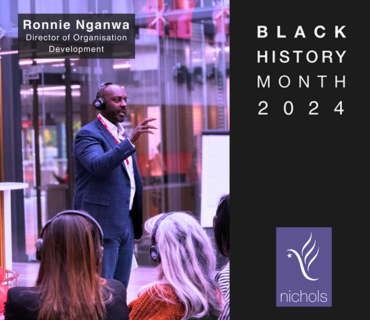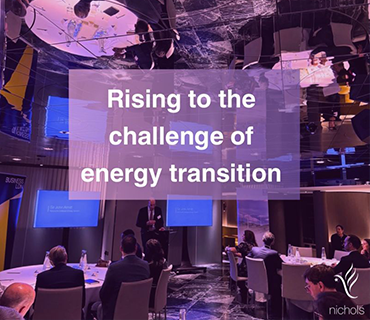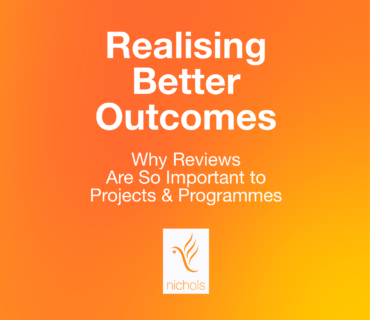- BC
- BC

News

News


Energy transition is not just a goal—it’s an imperative. Achieving net zero, fostering economic growth across the UK, and building resilience to climate change demand significant investment in infrastructure over the coming decades. However, with such ambitious objectives, how do we ensure these projects are delivered efficiently and effectively?
The National Infrastructure Commission’s latest report, Cost Drivers of Major Infrastructure Projects in the UK, sheds crucial light on this challenge. Through in-depth analysis and stakeholder engagement, the report outlines actions that could reduce outturn costs of enhancement projects by 10-25%.
Key insights include:
– The importance of clear strategic direction
– The critical role of strong client and project sponsorship
– Working effectively with regulators
– Flexing delivery models to take account of project characteristics and organisational context
At the heart of this lies the need for robust project sponsorship—a discipline that ensures projects remain aligned with strategic goals while managing complexity, risk, and stakeholder engagement.
In our paper, we explore how implementing effective project sponsorship can act as a cornerstone for delivering the infrastructure needed to power the energy transition. By tackling systemic challenges identified in the NIC report, we can transform ambition into action.
Click here to read our paper on project sponsorship: Nichols Sponsorship Paper.
Following on from last week’s clip on Project Sponsorship, Nichols’ Alexandra Batey details how an effective sponsoring body can help deliver UK energy transition.
Please contact info@nichols.uk.com if you would like to learn more about our work in setting up Project Sponsorship.
Delivering UK Energy Transition and other regulated utilities projects requires a strategic approach to enable effective delivery of outcomes. Project Sponsorship will be key to delivering a programme of national significance.
One of our Directors, Alexandra Batey MEng FICE, provides an overview on the role of Sponsors following our recent round table event on Energy Transition with key notes from Sir John Armitt and Rt Hon Chris Skidmore.
Please contact info@nichols.uk.com if you would like to learn more about our work in setting up Project Sponsorship.

At our energy round table at The Londoner Hotel earlier this month, there were some brilliant insights shared from a diverse room of experts, including our keynote speakers, Sir John Armitt and the Rt. Hon. Chris Skidmore. We have been reflecting on the mission ahead and our role as a company to help reach the goal of Net Zero by 2050.
At Nichols, we respect our planet and are committed to supporting the delivery of a sustainable and viable future. The need for action is more urgent than ever, Nichols can help clients realise projects and policies that will help to deliver decarbonisation goals.
With almost 50 years of experience delivering major iconic infrastructure programmes and a team of outstanding specialists, we understand the landscape and challenges of environmental issues. We have the knowledge and expertise to help across the entire environmental arena. We provide navigation through every stage of the project and programme lifecycle, from establishing the case for investment to strategic management of infrastructure delivery.
Nichols helps clients to achieve major change for the better, always providing a bespoke solution to meet client needs and exceed expectations.

Last week, Nichols was proud to participate at an event showcasing the Diversity and Inclusion efforts of 4 gas distribution networks.
To mark Black History Month, leaders and staff from Cadent Gas Limited, SGN, Northern Gas Networks and Wales & West Utilities came together to discuss and share experiences and best practices.
The event at Cadent Gas Limited’s head office in Ansty, Coventry was attended by Nichols’ Director of Organisation Development, Ronnie Zachary Nganwa.
He provided insights and actions on reclaiming personal narratives as a route to progressing within the workplace.
This was met with deep discussion and reflection in the audience, on the source of the stories we hold, and how they have a massive impact on the ways we work in teams and across organisations.
The story illuminated from the talk was the extent to which the organisations present held inclusivity as a strategic advantage and were willing to act on this from the top. This was by setting up and supporting communities and engagement events that help showcase the advantages of Diversity.
Nichols congratulates its friends from Cadent Gas (Diane Bennett, Neena Begra-Kukadia, Krishan Mistry, Belinda Asante & Gloria Adebayo) and from SGN (Sharon Dorrington & Tara Bridges).
We appreciate the invitation opportunity to participate.

A huge thank you to everyone who joined us on Thursday for an insightful and dynamic roundtable discussion on delivering clean energy and meeting Clean Power targets by 2030.
Special thanks to our keynote speakers Sir John Armitt, Chair of the National Infrastructure Commission, and Rt Hon Chris Skidmore, former Energy and Clean Growth Minister, for sharing their invaluable perspectives on improving project delivery certainty and driving strategic collaboration across sectors.
The road ahead is critical, and we are committed to working with both the private and public sectors to accelerate the energy transition and build a sustainable future for all.
Stay tuned for our upcoming Business Paper, where we will outline actionable steps to inform government policy and shape the future of the UK’s energy landscape.

Keynote speakers announced.
We are fast approaching the 17th October, when we will be holding our roundtable, “Rising to the challenge of energy transition”, at The Londoner Hotel.
We will be joined by keynote speakers, Sir John Armitt, Chair of the National Infrastructure Commission and Rt Hon Chris Skidmore, former U.K. Energy and Clean Growth Minister and Chair of the Net Zero Review.
The roundtable will explore how the public and private sectors can strategically align to strengthen the value of the anticipated investment across the energy and utility sectors and enhance energy security to achieve sustainable decarbonisation.

Nichols is delighted to be holding a roundtable taking place on Thursday 17 October at 09:00 – 11:30 in the Green Room at The Londoner Hotel, 38 Leicester Square, WC2H 7DX.
We are pleased to be joined by keynote speaker, Sir John Armitt, Chair of the National Infrastructure Commission.
This roundtable will explore how the public and private sectors can strategically align to strengthen the value of the anticipated investment across the energy and utility sectors and enhance energy security to achieve sustainable decarbonisation.
The insights from the session will be crafted into a comprehensive business whitepaper for Government.
Numbers for the event are limited but if you would like to apply for attendance, please email your name and contact details to info@nichols.uk.com by Tuesday 1st October. We will let you know if your application has been successful.

The most important element of a successful project is that it delivers its intended outcomes. While minimising cost and delivery time are essential goals, no project that fails to deliver what is planned can ever be considered a success.
Unfortunately, realising outcomes in the form of benefits is often a low priority for project teams, as benefits are typically realised late in a project’s life cycle. The review process, providing independent assessments at key stages, is well-positioned to help project teams develop their approach to benefits management from start to finish.
Why Do We Need Reviews?
– Independent and Focused Assurance: Reviews provide independent and focused assurance for projects and programs. This process is proven to lead to more effective delivery of projects with more predictable performance against time, cost, and quality.
– Continuous Learning: It is vital that we constantly challenge ourselves to learn from experience when things go right and, perhaps even more importantly, when things go wrong.
Review Benefits
– Objective Assessment: An independent, objective view of a project’s strengths and areas for improvement.
– Clear Recommendations: Clear recommendations for future improvement.
– Process Evaluation: An opportunity to evaluate the effectiveness of processes and systems.
– Early Problem Identification: Identifying problems not currently recognised by the project or program to allow early mitigation.
– Health Check: Ascertaining the overall health of a project or program and its confidence in successfully delivering the benefits.
When Things Go Wrong
When projects encounter issues, a review is crucial to diagnose problems, reassess strategies, and realign objectives. It serves as a structured approach to uncover the root causes of failures, identify risks, and provide actionable recommendations to steer the project back on track.
The Review Approach
Asking different people will give you different answers, but at the heart of it, we should:
– Look, Listen, and Observe: Achieve real-time understanding of progress and issues by integrating with stakeholders and undertaking direct fieldwork.
– Analyse: Identify areas of strategic importance to test and challenge.
– Test, Challenge, and Provide Independent Scrutiny: Triangulate findings and draw together evidence from a range of sources. Question inconsistencies and anomalies; acting as a ‘critical friend’ is imperative.
– Integrate, Interpret, and Report: Synthesise feedback from the analysis, test, and challenge activities; evaluate risks; and report openly.
– Communicate: Deliver difficult messages based on evidence while operating in a ‘no surprises’ environment. Communicate clearly so sponsors understand the implications of risks or issues materialising and the necessary decisions required.
Nichols’ Commitment
Nichols has been a trusted friend and partner to our clients doing just this.
We deploy a high-calibre team of experts with extensive experience across a range of industries, providing valuable insights to enable immediate and lasting benefits. Drawing on our experience working across all sectors, we share best practices and learn from comparable programs.
Our tailored approach, clear and open communication style, and focused recommendations have supported our clients in enabling the successful delivery of major programs for half a century.
Visit Reviews | Nichols

Temporary spaces in London aren’t being used effectively.
We can revitalise London’s high streets using data.
Nichols explored this at London Data Week earlier this week.
On the 2 July, we had the privilege of participating in London Data Week’s Data Partnerships event hosted by BusinessLDN. We pondered the following questions:
What does smartness in a smart city look like in London today?
How is data already being used to solve problems and drive inclusive growth?
Joanne Haskins, Innovation Expert at Nichols, took to the stage to discuss how we could use data to improve the temporary uses of vacant spaces on London’s lost high streets.
The discussion revolved around leveraging data to reimagine these spaces for short-term solutions, maximising their potential until permanent transformations can be realised. It was inspiring to see how data-driven insights can pave the way for meaningful urban revitalisation. This is something Nichols understands well from our role in the Towns Fund Programme in 2022.
At Nichols, we are passionate about harnessing data to create actionable solutions that benefit our communities and urban environments. We believe in the power of collaboration and innovation to drive positive change.
Other talks were given by Dr Yijing Li, Senior Lecturer in Urban Informatics at King’s College London on improving air quality with data and Richard Ford, Partner, Planning Environment, Digital Delivery, Energy & Infrastructure, Pinsent Masons who discussed how can data trusts support food supply chain management.
A huge thank you to London Data Week for hosting such a dynamic event, and to everyone who joined us in exploring the future of London. Let’s continue to innovate and build a brighter, more sustainable future together.